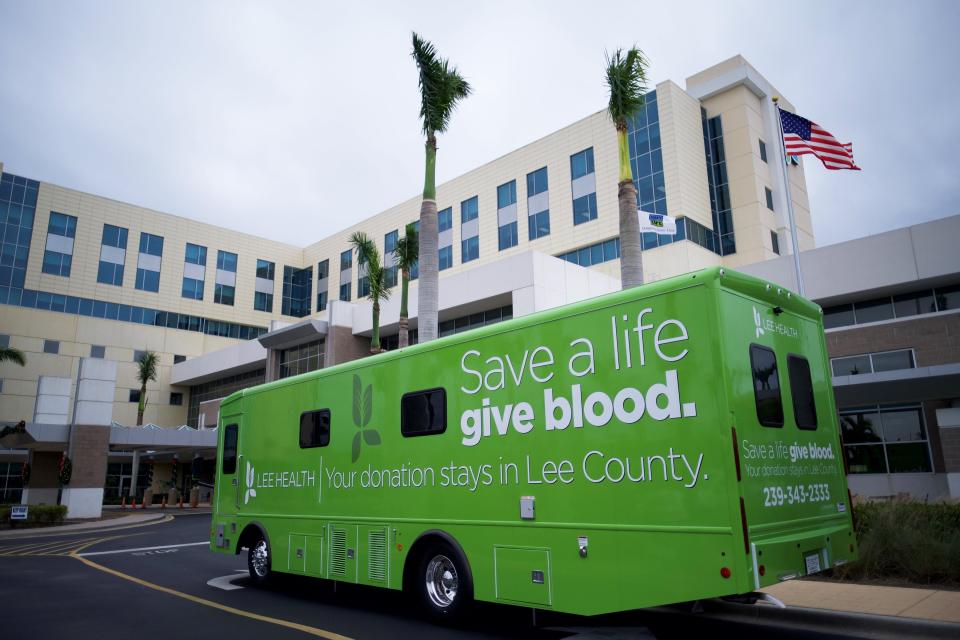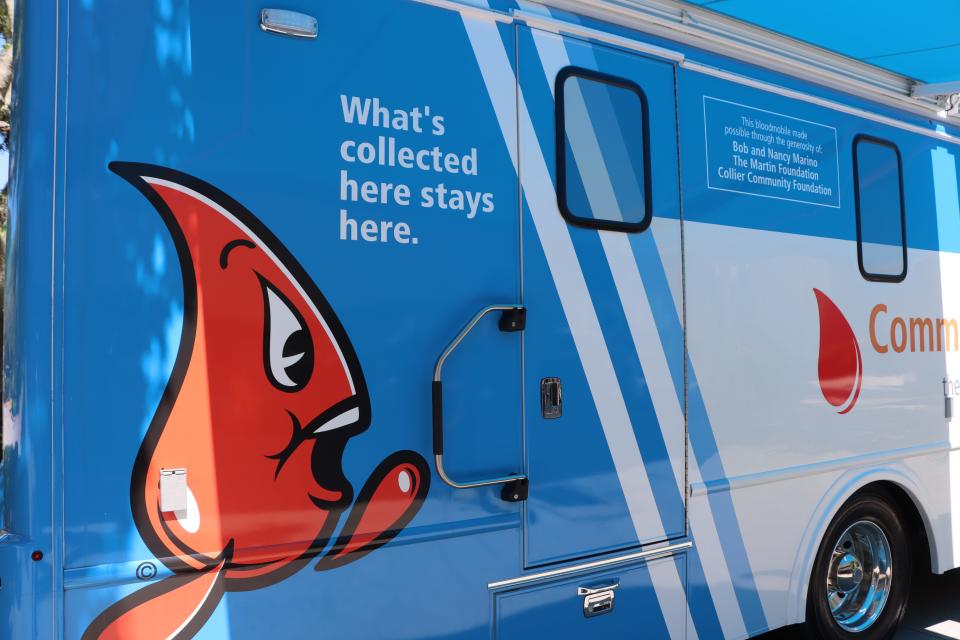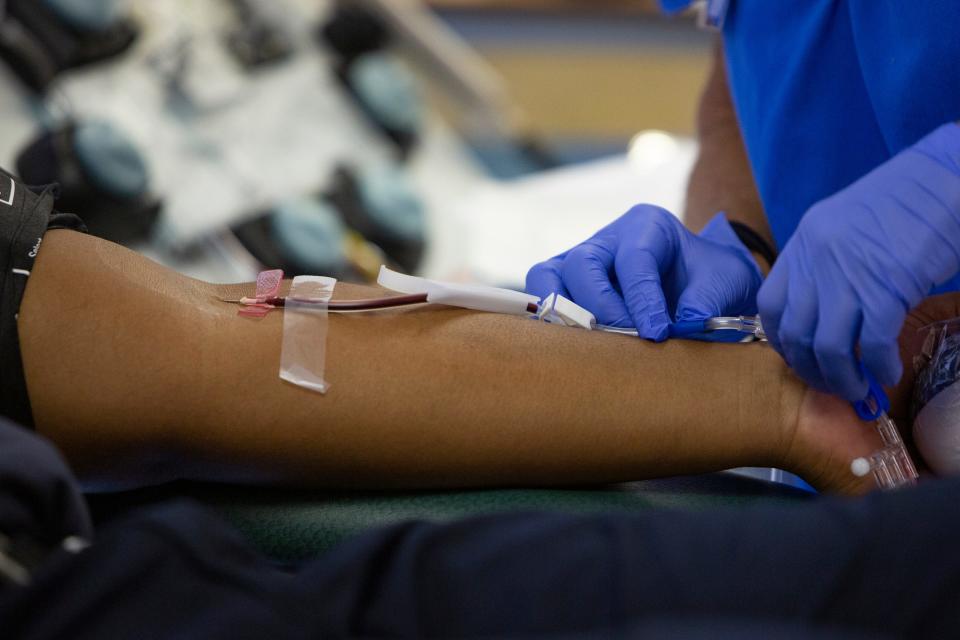SWFL blood centers drop screening questions that target gay men
Southwest Florida blood centers are moving toward a new federal guidance that eliminates questions on sexual orientation or gender for blood donors.
Lee Health, the publicly-operated hospital system in Lee County, is aiming for early October to launch new individual-based risk assessments of donors that was finalized by the U.S. Food and Drug Administration in mid-May.
The NCH Healthcare System in Collier County put its updated donor questionnaire into service at the end of July.
OneBlood, a large nonprofit blood center based in Orlando, will implement the changes Aug. 21.
The organization serves 250 hospitals in Florida, North Carolina, South Carolina, Georgia and Alabama.
There is no hard deadline for when blood centers nationwide must be in compliance, said Jeremy Puckett, supervisor of Lee Health’s blood center. The FDA only wants to make sure blood centers are working toward the new guidance, he said.
The earlier policy required gay and bisexual men to wait three months following their last sexual contact with another man before donating blood.
What’s the change?
Screening questions today will be the same for every donor regardless of sexual orientation, sex or gender.
“All prospective donors who report having a new sexual partner, or more than one sexual partner in the last three months, and anal six in the past three months, would be deferred to reduce the likelihood of donations by individuals with new or recent HIV infection who may be in the window period for detection of HIV by nucleic acid testing,” according to the FDA.
In addition, anyone taking medications to treat or prevent HIV infection, pre-exposure or post-exposure medications, will be deferred, according to the FDA guidance. The reason is the medications may delay detection of HIV by currently licensed screening tests for blood donations.
Blood centers have been screening blood for HIV since 1985.
More: NCH Heart Institute gets preliminary approval from Naples design board
More: Lee Health examines pros and cons of changing to private, nonprofit system
The federal agency said the updated policy is based on the best available scientific evidence and will potentially increase the number of people eligible to donate while maintaining safeguards to protect the blood supply.
Blood centers across the U.S. continue to face shortages of blood products that remains tied to donor declines during the COVID-19 pandemic while the need blood for treating illnesses and injuries remains high.
The updated policy is in line with rules in the United Kingdom and Canada, the FDA said.
What have other national organizations said?
The previous policy “made it challenging for gay and bisexual men” to donate blood, according to OneBlood.
The three-month deferral guidance for gay men to donate blood was adopted in 2020 when donations dropped dramatically during the COVID-19 pandemic.

Before that the change in 2020, the policy in place since 2015 was a one-year wait period for gay men to donate blood after their last sexual contact with another man, according to OneBlood.
During the height of the HIV/AIDS epidemic in the 1980s and for more than two decades, there was a lifetime ban on gay men donating blood.
“The FDA’s shift in policy is the start of a new era of blood donor eligibility,” Susan Forbes, spokeswoman for the Orlando-based OneBlood, said in a news release following the revised guideline in May.
OneBlood was one of three of the largest blood centers in the U.S. that enrolled gay and bisexual men in a two-year safety study that helped the FDA in its decision.
The other two organizations are Vitalant, which has donor locations in 20 states, and the American Red Cross.

The Red Cross said in a statement Aug. 2 that the new guidance is a historic change to donor eligibility. The Red Cross enacted the change Aug. 7.
“The Red Cross is committed to achieving an inclusive blood donation process that treats all potential donors with equality and respect, and ensures a safe, sufficient blood supply is readily available for patients in need,” the organization said.
AABB, previously known as the Association for the Advancement of Blood and Biotherapies, described the guideline as a “momentous change,” Debra BenAvram, chief executive officer of AABB, said.
Are Southwest Florida blood centers ready?
Southwest Florida blood centers have been getting into compliance with new guidance.
It requires revising screening questions and updating the computer software system which is taking some time, Puckett, at Lee Health, said.
For instance, reference to “males” and “females” in the previous screening questions are coming out, he said.
“That is a huge difference,” he said.
There’s also staff training that needs to be done among his 27-person workforce.
The hope is to be ready in September or October but it could get pushed back to the end of the year, he said.

He’s optimistic the guidance change will bring in more donors; the Lee Health blood center collects 17,000 whole blood products a year.
NCH’s Community Blood Center completed what changes needed to be done by the end of July, said Laura Rosen, community relations manager at the blood center.
The FDA had been looking at the change for many years, Rosen said.
“Community Blood Center personnel have received training on the new guidance and the new forms are presently being used on (our) bloodmobiles and at the walk-in donor center,” she said.
It’s too early to say if the revisions will boost donations, Rosen said.
Guidance from AABB to blood centers on donors:
• All blood donors, regardless of gender or sexual orientation, will be asked if they’ve had new and/ or multiple sexual partners in the past three months.
• If they answer no to both questions, there is no risk of a newly acquired transfusion-transmitted infection. They will not be asked about the type of sexual contact and will move on to the next question.
• If they answer yes to either, there is some risk of a newly acquired transfusion-transmitted infection. Therefore, they will then be asked if they’ve had anal sex with any of these partners. If they have, they will be required to wait three months from when they most recently had anal sex to donate.
• If they have not had anal sex with a new and/or multiple partners and meet all other eligibility criteria, they will be able to donate.
• Asking about anal sex in the context of new or multiple recent partners allows blood collectors to more precisely and reliably identify those who may have an increased risk of a newly acquired transfusion-transmissible infection.
This article originally appeared on Naples Daily News: Blood centers drop screening questions that target gay men

